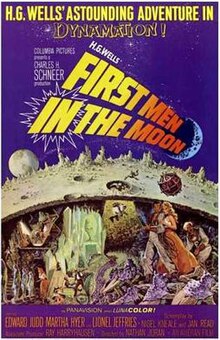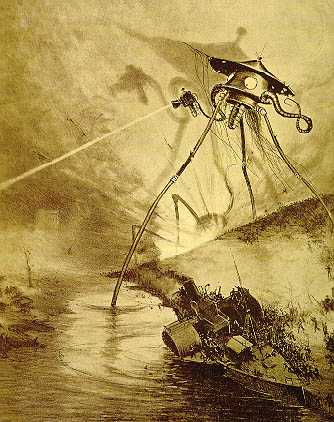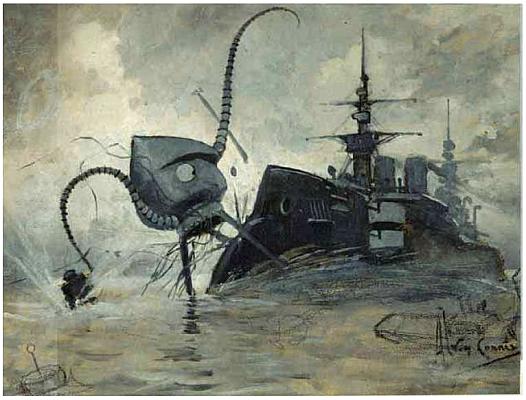This is the first part of a two-part series on two early science fiction writers: C.S. Lewis and H.G. Wells. While they were both British novelists in the early 20th century, they had quite different worldviews. Part 1 discusses C.S. Lewis’ reading of Wells and the basic plotline of The War of the Worlds, Wells’ first science fiction novel. Part 2 presents some of Wells’ themes and Lewis’ critique of “Wellsianity.”
Our Eschatological Age
We live in an apocalyptic age, filled with post-9/11 politics, economic catastrophes, great droughts, deadly storms, genocidal earthquakes, and  nuclear threats. We live in an age when a wave from the sea can wipe out a generation of technological imperialism, and when the cryptic astronomical observations of an ancient Mesoamerican culture can move people to look to the skies again. Then there is Israel, and Tim Lahaye, and the evident death of popular music. It might not actually be the Last Days, but it sure feels like it.
nuclear threats. We live in an age when a wave from the sea can wipe out a generation of technological imperialism, and when the cryptic astronomical observations of an ancient Mesoamerican culture can move people to look to the skies again. Then there is Israel, and Tim Lahaye, and the evident death of popular music. It might not actually be the Last Days, but it sure feels like it.
Taking advantage of our culture’s eschatological leanings, I teach a class on the End of the World most every year. One of the reading options is H.G. Wells’ The War of the Worlds. This summer’s discussion was particularly good, as students drew from the deep waters of Wells’ social  critique. His stories are not just stories for art’s sake—they do something, they tell truth from his perspective.
critique. His stories are not just stories for art’s sake—they do something, they tell truth from his perspective.
So it was in rereading The War of the Worlds this year as I was reading through Lewis’s Ransom Trilogy (also called the Space or Cosmic Trilogy) that I saw how clearly Lewis was responding to Wells. As a fan of H.G. Wells’ literature, C.S. Lewis was taking the classic Martian tale and inverting it. Lewis turned The War of the Worlds upside down, providing his own interplanetary romances that subvert Wells’ perspective on truth.
Becoming a Fan
While the victim of a maniacal bullying schoolmaster who had the impressive inability to broaden pupils’ minds—at a school C.S. Lewis called “Belsen” after the concentration camp—the young Lewis found solace in the scant reading material that was available. Among his discoveries that stuck for life was H.G. Wells. In his autobiography he reflects on the experience:
“What has worn better, and what I took to at the same time, is the … the ‘scientifiction’ of H. G. Wells. The idea of other planets exercised upon me then a peculiar, heady attraction, which was quite different from any other of my literary interests” (Surprised by Joy 38).
At eleven, Lewis devoured Wells’ First Men in the Moon, a gift from his father. When he was sixteen, his best friend Arthur sent him a copy of The Country of  the Blind and Other Stories. We see in this prep school teenager the beginnings of both literary friendship and literary criticism:
the Blind and Other Stories. We see in this prep school teenager the beginnings of both literary friendship and literary criticism:
“I have only just discovered that you put my name in that book. If I had seen it earlier I shd. have sent it back. You have no right to be so foolishly generous! However–many, many thanks. When one has set aside the rubbish that H. G. Wells always puts in, there remains a great deal of original, thoughtful and suggestive work in it. The ‘Door in the Wall’, for instance, moved me in a way ‘Door in the Wall’, for instance, moved me in a way I can hardly describe! How true it all is: the SEEING ONE walks out into joy and happiness unthinkable, where the dull, senseless eyes of the world see only destruction & death. ‘The Plattner Story’ & ‘Under the Knife’ are the next best: they have given me a great deal of pleasure” (Letter to Arthur Greeves c. Sept 26, 1914).
As an established writer on the heels of writing his Cosmic Trilogy and The Screwtape Letters, Lewis describes his debt to H.G. Wells in a letter to Ruth Pitter (Jan 4, 1947). And in a letter to Arthur in 1931, Lewis admits that H.G. Wells’ romances were “almost his first love.” Lewis didn’t always love Wells’ stories, but he always found they engaged his attention and helped him in his intellectual search, as we see here:
“You will be surprised when you hear how I employed the return journey–by reading an H. G. Wells novel called ‘Marriage’, and perhaps more surprised when I say that I thoroughly enjoyed it; one thing you can say for the man is that he really is interested in all the big, outside questions–and the characters are intensely real, especially a Mr Pope who reminds me of Excellenz [a derogative term for his father]. It opens new landscapes to me–how one felt that on finding that a new kind of book was waiting for one, in the old days–and I have decided to read some more of his serious books” (Letter to Arthur Greeves c. Feb 3, 1920).
Christian Disagreement with Wells
As a Christian, Lewis found great disagreement with H.G. Wells, a Darwinian atheist. While they had once shared intellectual quarters, Lewis found that the greatest authors in his world were this strange breed of intellectual called “Christian.”  In a sense, Lewis’ relationship with Wells is part of his conversion:
In a sense, Lewis’ relationship with Wells is part of his conversion:
“On the other hand, those writers who did not suffer from religion and with whom in theory my sympathy ought to have been complete—Shaw and Wells and Mill and Gibbon and Voltaire—all seemed a little thin; what as boys we called ‘tinny.’ It wasn’t that I didn’t like them. They were all (especially Gibbon) entertaining; but hardly more. There seemed to be no depth in them. They were too simple. The roughness and density of life did not appear in their books” (Surprised by Joy 202).
Lewis’ developing disagreement with Wells was profound. He adopted the Inklings term, “Wellsianity,” to describe in his essays “Is Theology Poetry” and “The Funeral of a Great Myth” the scientific myths of progress in his age as betrayed by Wells’ literary social Darwinism. Lewis disbelieved in progress, argued that things were not actually progressing (WWII would later become evidence), and was incredulous that people thought that technological progress could bring about human improvement. He was very much an anti-Wells writer.
At a deeper level, though, Lewis engages in Wells in his fiction, and quite clearly does so in the Ransom Trilogy, turning The War of the Worlds inside out to retell the story of what it means to be human.
H.G. Wells’ The War of the Worlds
Wells’ own understanding of humanity is clear throughout his work, and especially in his 1898 novel The War of the Worlds. Wells’ contemporaries  viewed their Western culture as the pinnacle of human society. But, in Wells’ narrative, that view is put into a new context:
viewed their Western culture as the pinnacle of human society. But, in Wells’ narrative, that view is put into a new context:
“No one would have believed in the last years of the nineteenth century that this world was being watched keenly and closely by intelligences greater than man’s and yet as mortal as his own; that as men busied themselves about their various concerns they were scrutinised and studied, perhaps almost as narrowly as a man with a microscope might scrutinise the transient creatures that swarm and multiply in a drop of water…. With infinite complacency men went to and fro over this globe about their little affairs, serene in their assurance of their empire over matter” (7).
These Watchers are also Actors, and vastly superior to us:
“Yet across the gulf of space, minds that are to our minds as ours are to those of the beasts that perish, intellects vast and cool and unsympathetic, regarded this earth with envious eyes, and slowly and surely drew their plans against us” (8).
The stage is well set, and the plotline is fairly simple. Martians invade with such vastly superior weaponry and armor that the British militia is almost  entirely useless against them. The Martians—rotund fleshly bodies that operate terrifying, giant tripod—roam through the English countryside toward London planting Martian vegetation, wasting entire villages, and capturing humans to feed upon as a spider feeds on the insects in her web. “This isn’t a war,” one character exclaims. “It never was a war, any more than there’s war between man and ants” (173).
entirely useless against them. The Martians—rotund fleshly bodies that operate terrifying, giant tripod—roam through the English countryside toward London planting Martian vegetation, wasting entire villages, and capturing humans to feed upon as a spider feeds on the insects in her web. “This isn’t a war,” one character exclaims. “It never was a war, any more than there’s war between man and ants” (173).
See part 2 here.






















Thanks! Good stuff. Sanford Schwartz goes into great detail about the Lewis-Wells connection in “C.S. Lewis on the Final Frontier,” which I’ve posted about here: http://iambicadmonit.blogspot.com/2009/07/report-on-perelandra-colloquium-1.html and here: http://iambicadmonit.blogspot.com/2007/11/c-s-lewis-conference-report.html. It’s a really great book, and you would love it (and I know I’m annoying you by recommending it every five minutes) — but your readers would love it, too!
Thanks for putting this up here Sorina. I have that book and 4 or 5 others (plus Charlie Starr’s thesis) to read. As you know, I think, I don’t read secondary stuff until I’ve gone through all the primary stuff. I’ve never read a biography on Lewis–I want to get my own feeling first.
But Scwartz is on the radar, this fall I suppose.
Fantastic research and presentation. Looking forward to reading part 2!
Great post! Your quote from Lewis hit a chord in me: “There seemed to be no depth in them. They were too simple. The roughness and density of life did not appear in their books.” My wife and I and another couple were watching a debate between William Lane Craig and Stephen Law recently, and we all felt the same about Law.
I have read some pretty solid atheists, but I generally feel that way about this bunch of new atheist. Hitchens was a pretty good writer, and had great shocking social commentary, but the stuff behind it was quite old.
Pingback: The War of the Worldviews: H.G. Wells vs. C.S. Lewis (Part 2) | A Pilgrim in Narnia
Pingback: The Difference Between Pressure & Discipline: My Reflection on my 100th Post | A Pilgrim in Narnia
Pingback: A Year of Reading | A Pilgrim in Narnia
Pingback: Aliens & Space, Theology & Dreams [justin] « TheoCult Collective
Pingback: C.S. Lewis’ Poem “The Planets” | A Pilgrim in Narnia
Pingback: A Prophetic Warning from H.G. Wells, or Object Lessons on the Way | A Pilgrim in Narnia
Pingback: C.S. Lewis’ 1st SciFi Fan Letters, from Evelyn Underhill and Roger Lancelyn Green | A Pilgrim in Narnia
Pingback: The Heart of C.S. Lewis’ Spiritual Legacy | A Pilgrim in Narnia
Pingback: 2013: A Year of Reading | A Pilgrim in Narnia
Pingback: Out of the Silent Planet, the comic book. By AaronTP | A Pilgrim in Narnia
Pingback: Writing Process Blog Hop! (#WritingWednesdays) | A Pilgrim in Narnia
Pingback: Two Different Prefaces to C.S. Lewis’ “That Hideous Strength” | A Pilgrim in Narnia
Pingback: “The Myth of Empty Space” by Dallas Willard | A Pilgrim in Narnia
Pingback: 2014: A Year of Reading | A Pilgrim in Narnia
Pingback: A Sarcasta-Review of the Ransom Trilogy by J.B.S. Haldane | A Pilgrim in Narnia
Pingback: “A Novelist’s Business is Lying”: What SciFi Can Do by Ursula K. Le Guin | A Pilgrim in Narnia
Pingback: Ficção científica contra o cientificismo | Esperando as Musas
Pingback: Yatta! Chronological Reading of C.S. Lewis Complete | A Pilgrim in Narnia
Pingback: Why I Read C.S. Lewis Chronologically | A Pilgrim in Narnia
Pingback: What is the Significance of Worc(h)ester in C.S. Lewis’ Ransom Cycle? | A Pilgrim in Narnia
Pingback: Leatherhead and Literary Coincidence, with C.S. Lewis and H.G. Wells | A Pilgrim in Narnia
Pingback: “Men must endure their going hence”: The Idea of Death in C.S. Lewis’s “Out of the Silent Planet”: Guest Post by Levi Nunnink | A Pilgrim in Narnia
One small word of correction: In HG Wells’ famous tale, the Martians sit in the tripods and operate them as vehicles. There is nothing in the text to suggest the tripods are operated telepathically.
Thanks, I made that correction.
Pingback: “The Planets” in C.S. Lewis’ Writing, with a Planet Narnia Chart (Throwback Thursday) | A Pilgrim in Narnia
Pingback: C.S. Lewis’ Out of the Silent Planet: A 10 Minute Book Talk with Brenton Dickieson | A Pilgrim in Narnia
Pingback: N.K. Jemisin’s Super Strange Urban Apocalypse in The City We Became: Part 2: The City I Can’t Become (Blogging the Hugos 2021) | A Pilgrim in Narnia
Pingback: Thoughts on Classic and Contemporary SF vs. Fantasy Hugo Best Novel Award Winners while Failing to Write a Review of a Great Book that was not Nominated | A Pilgrim in Narnia
Thanks for bringing together Wells and Lewis like this. I learnt a lot from the comparison. However, I wonder ifLewis was quite so happy to accept biological evolution. Granted that his target was the idea of progress he nevertheless wrote ridiculing evolution. See the very funny Evolutionary Hymn. I don’t think that progress and evolution were as distinct in Lewis’ mind as you suggest. They certainly were not for Wells of course.
Best wishes
It’s a good question, Simon. Since I wrote this piece, there has been quite a movement to bring Lewis into the Intelligent Design conversation (the American religious conversation, specifically). When Intelligent Design means that an intelligent, loving God intentionally made and makes the universe and reveals the matter of the making for us, Lewis would certainly agree. He would not have much philosophical to add to that conversation, except that he was often capable of striking imagery, and his view of incarnation and trinitarian theology may fill that idea out.
However, there is also a movement to bring Lewis into something like the American fundamentalist idea of young-earth creationism because Lewis had doubts about the “winners” of the scientific conversation (I think he did) and because he resisted various kinds of social Darwinism (which he certainly did). At the foundation of Lewis’ apologetics project, though, is the idea of God using evolution as the creative project. Indeed, again and again, Lewis used the common (popular, not scientifically up-to-date) understanding of evolution to engage culturally and philosophically, while rigorously resisting the implications of Wellsianity type progress or other ways of applying the science to morality or human self-understanding. In his fiction, he used the mode of creation that suited the mythic mode of being in the text: evolution in the Venus-Milton SciFi paradise of Perelandra, and Aslan singing creation into being in the Fairy Tale Narnia.
Your question is cool because it hits on a word (progress) that was loaded in certain ways in Lewis’ context and in ours. The only distinction I can make is that “progress” for Lewis required a “to” and “from,” that movement forward is not necessarily progress, and that you can’t call what happens in evolution “progress.” Evolution is just change. That we name it progress or speak of higher-order animals is because humans uniquely reflect upon change, naming it good, bad, effective, restrictive, progress, or recovery because we uniquely have the reflective capacity to watch the change and weigh it in human-centred ways. To name it, though, is to imply a bar of measurement. Change in seeing capacity in a species is weighed in science my measures of sophistication, capacity, and adaptability, not “good” and “bad” in a moral sense. When a scientists notes mutations in the eyes of marsh creatures that create ocular deficiencies that make the animals less adaptive or less capacious as predators or survivors, and when the scientists demonstrates that the mutation is because of humans polluting the lake, that scientist may speak of them as “bad” change. When the scientist moves to that mode, however, they are speaking as moral human beings, and the “bad” there is about responsibility, moral evil, the destruction of beauty, the causing pain, and a judgement on greed or sloth or another sin. That measurement is the one that we humans share at its deepest roots, for the most part.
Whatever Lewis thought about progress, it doesn’t mean what we mean it in American political debates or in the theology or cultural criticism of some of Lewis’ American readers. And progress doesn’t mean what Wells and other social critics meant in their time. Neither is it equated with technological innovation or urban development or the spread of empires.
So I think that there is a knife cut between progress and evolution for Lewis, even if it is a subtle blade.
Pingback: A Rationale for Teaching C.S. Lewis’ Fiction in The Wrong Order | A Pilgrim in Narnia